Tumbling UK Housing Market Leading to Sterling Devaluation
Housing-Market / UK Housing Apr 11, 2008 - 09:50 AM GMTBy: Gary_Dorsch

 Economic events in the United States often provide a sneak preview of what's around the corner for the British economy. Both countries run large external trade deficits, and much like the US, the British economy has been expanding on little else than the availability of easy credit and asset price inflation in the housing market. The ties between the US and UK run even deeper. About half of the profits for FTSE companies come from overseas, and 15% from US-based affiliates.
Economic events in the United States often provide a sneak preview of what's around the corner for the British economy. Both countries run large external trade deficits, and much like the US, the British economy has been expanding on little else than the availability of easy credit and asset price inflation in the housing market. The ties between the US and UK run even deeper. About half of the profits for FTSE companies come from overseas, and 15% from US-based affiliates.
Imaginative lending practices fueled a doubling of British home prices over the past six-years, the key engine of growth for the world's fifth largest economy. But British borrowers now face a perilous situation where their home values are tumbling, and the local banking oligarchs are lifting their lending rates, in order to recoup big losses of up to 20 billion pounds in toxic sub-prime mortgages.
Little of the Bank of England's (BoE) three rate cuts since December have been passed on to debt strapped consumers, now locked in a genuine credit crunch. “Credit conditions have tightened and the availability of credit appears to be worsening. The disruption in financial markets could lead to a slowdown in the economy that is sufficiently sharp to pull inflation below target,” explained the BoE in order to justify its quarter-point rate cut to 5.00 percent.
In December 2003, then Chancellor of the Exchequer Gordon Brown instructed the BoE to keep a lid on the consumer inflation at 2% or less, by adjusting interest rates upward, when inflation rose above target. Brown told the BoE to target the harmonized index of consumer prices (HICP), adopted by the Euro zone, measuring the retail prices of goods and services, but excluding volatile housing costs.
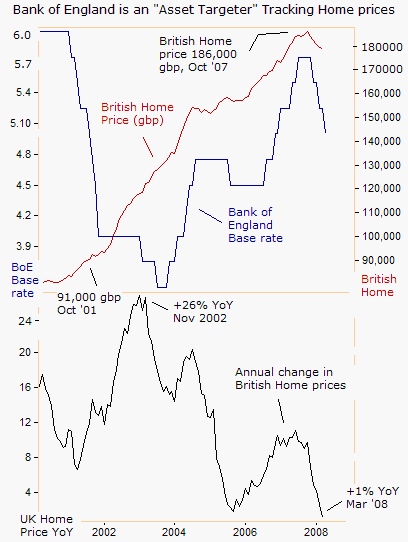
Yet the BoE lowered its base rate to 5% this week, even though inflation is above target and BoE chief Mervyn King has predicted rising food prices and energy prices could lift the inflation rate higher to 3 percent. Britain's major gas and electricity suppliers raised their prices by 15%, and the cost of a basket of groceries is up 12%, increasing the average family food bill by 750 pounds per year. “Because we've got low inflation, we can cut interest rates,” British PM Gordon Brown told the BBC.
Under heavy political pressure, the BoE has abandoned “Inflation Targeting,” and instead, is pursuing a radical policy of “Asset Targeting,” or adjusting interest rates in order to influence the direction of home prices and the stock market. The BoE has been a champion of “Asset Targeting” for quite some time. In 2001, the BoE slashed interest rates alongside the Greenspan Fed, with both central banks attempting to inflate home prices and arrest the slide in equity markets.
The BoE began to reverse its rate cuts a year earlier than the Fed, when British home price inflation was sizzling at a 26% annualized clip in late 2002. Hiking rates in slow motion over the next four years, the BoE finally broke the back of real estate inflation, when it lifted its base lending rate to 5.75% on July 5, 2007, adding heavy pressure on households shouldering 1.3 trillion pounds of debt.
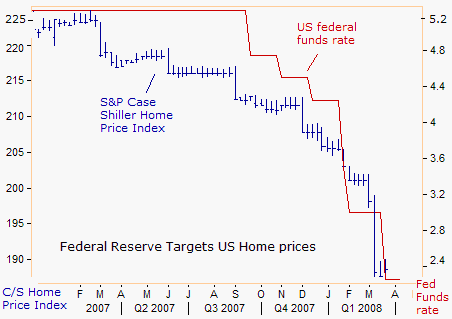
The Bernanke Fed has also adopted “Asset Targeting,” and is slashing the fed funds rate at a frantic pace in reaction to the sliding S&P Case Shiller Home price Index, which is 11.7% lower from a year ago. The Fed is desperately trying to put a floor under US home prices, by pegging interest rates far below the inflation rate, rapidly expanding the MZM money supply (+17% yoy), and swapping hundreds of billions of US Treasuries with bankers, in exchange for toxic AAA sub-prime mortgages.
Last month, the BoE injected £15 billion into London money markets, and hinted a baby-step rate cuts. “I want to assure you that the Bank will provide the liquidity assistance that the system needs in order to restore confidence. Such lending can be only a temporary measure, but it can be a useful bridge to a longer-term solution,” BoE chief King said. However, King rejected requests from British bankers to swap for toxic mortgage-backed securities. “The BoE is not proposing schemes that would require the taxpayer, rather than the banks, to assume the credit risk.”
British bankers are in a fright, after the International Monetary Fund said on April 5th that home prices in the UK and Ireland are vulnerable to a sharp 30% correction. “Home prices that look particularly vulnerable to a further correction are in Ireland, the United Kingdom, the Netherlands, and France. In these economies, it is difficult to account for the magnitude of the run-up in house prices.”
In the UK, the average home price is around £178,000, and if the IMF is correct, a 30% slide would knock home values lower to around £124,000, leaving many homeowners vulnerable to negative equity. In the US, somewhere between 10 and 15 million homeowners might find their homes are worth less than the amount of their loans, with home prices roughly 11% lower from a year ago.
British home prices tumbled by 2.5% in March, their biggest monthly decline since the early 1990's. The annual pace of house price inflation fell to 1.1%, the slowest annual growth rate for 12-years, and could go negative as the credit crunch bites into the real economy. There were just 49,000 loans made to UK home buyers in February, the lowest level in 16-years, and 33% less than February 2007. Thus, the BoE is still facing enormous pressure from Prime Minister Gordon Brown to continue cutting rates as slumping home prices threatens to topple the UK's asset based economy, rattled by the shocks emanating from the credit squeeze.
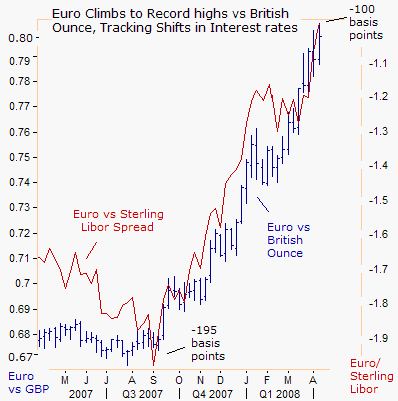
On the other side of the English Channel, European Central Bank President Jean Trichet is ruling out lower Euro interest rates anytime soon, and instead, is utilizing the stronger Euro to help shield the Euro zone economy from soaring food, energy, and raw material import prices. In a veiled warning to stock market operators, “The level of uncertainty in financial markets remains unusually high and tensions may last longer than initially expected. Financial market turbulence could have a broader than currently expected impact on the real economy,” Trichet said.
“Against this background, we emphasize that maintaining price stability in the medium term is our primary objective. There is certainly no room for complacency. Second-round effects stemming from the impact of higher energy and food prices on wage and price-setting behavior must be avoided. In the view of the Governing Council, this is of key importance,” Trichet said on April 10th.
With Euro interest rates holding steady and British interest rates edging lower, the Euro reached a record high of 80.3 pence this week, up 17% from a year ago. The British ounce's interest rate advantage over the Euro has narrowed by 95 basis points since September to roughly +100 basis points today. The Euro also briefly hit a record high of $1.5900 against the US dollar, amid ideas the Bernanke Fed will lower the fed funds rate on April 30th, widening the Euro's interest rate advantage.
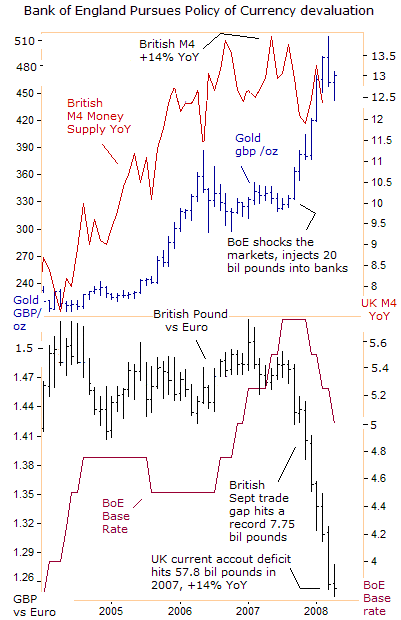
Underscoring the British currency's weakness against the Euro, the UK economy has run a current account deficit in every quarter since the third quarter of 1998. Last year, the UK's the current account shortfall hit a record GBP 57.8 billion, up from GBP 50.7 billion in 2006. The deficit was equivalent to minus -4.2% of GDP versus minus -3.9% in 2006. In contrast, the Euro zone earned a 15 billion euro current account surplus, or +0.2% of its economy's output.
Part of the British ounce's misfortune is linked to declining North Sea oil output, which peaked in 2000 and fell 9% to 2.9 million barrels of oil equivalent last year. The UK Offshore Operators Association expects North Sea oil output to be 250,000 barrels lower on average over the remainder of the decade. UKOOA is also predicting investment will fall to as little as £4bn this year compared with £5.6bn last year, at a time when costs are rocketing due to equipment shortages.
When a central bank of a external deficit country lowers its interest rates, it opens its currency to speculative attack. The Euro zone accounts for about 60% of UK exports, so the BoE appears to be engineering a devaluation of the British ounce, to boost UK multinational income earned in the Euro zone and the US. Interestingly enough, the BoE and the Federal Reserve are pursuing similar policies, devaluing their currencies to boost exports and multinational income, in order to offset the deleterious impact on consumer spending at home, from sliding home prices.
But rarely can countries devalue their way to prosperity. Most likely, the BoE's and Fed's currency devaluation schemes will end-up in the “Stagflation” trap, or stagnant economies gripped by escalating consumer and producer prices. The BoE has been inflating its M4 money supply at double-digit rates for the past three years, doubling the price of gold against the British ounce, in the process.
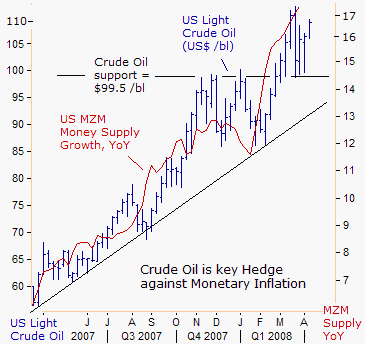
The Fed's strategy of jigging up the stock market with massive injections of liquidity, is also back-firing, because of crude oil's new found role as an inflation hedge, against a weak US$ and the money supply created by the Fed. If Mr Bernanke tries to inflate the US money supply growth rate from 17% today to as high as 20% this summer, while the BoE expands the UK money supply, crude oil could climb towards $125 /barrel, and sink the global economy deeper into recession.
By Gary Dorsch,
Editor, Global Money Trends newsletter
http://www.sirchartsalot.com
To stay on top of volatile markets, subscribe to the Global Money Trends newsletter today, for insightful analysis and predictions for the (1) top stock markets around the world, (2) Commodities such as crude oil, copper, gold, silver, and related gold mining and oil company indexes (3) Foreign currencies (4) Libor interest rates, global bond markets and central bank monetary policies, and (5) Central banker "Jawboning" and Intervention techniques that move markets.
GMT filters important news and information into (1) bullet-point, easy to understand analysis, (2) featuring "Inter-Market Technical Analysis" that visually displays the dynamic inter-relationships between foreign currencies, commodities, interest rates and the stock markets from a dozen key countries around the world. Also included are (3) charts of key economic statistics of foreign countries that move markets.
Subscribers can also listen to bi-weekly Audio Broadcasts, with the latest news on global markets, and view our updated model portfolio for Q'1, 2008. To order a subscription to Global Money Trends, click on the hyperlink below, http://www.sirchartsalot.com/newsletters.php
Mr Dorsch worked on the trading floor of the Chicago Mercantile Exchange for nine years as the chief Financial Futures Analyst for three clearing firms, Oppenheimer Rouse Futures Inc, GH Miller and Company, and a commodity fund at the LNS Financial Group.
As a transactional broker for Charles Schwab's Global Investment Services department, Mr Dorsch handled thousands of customer trades in 45 stock exchanges around the world, including Australia, Canada, Japan, Hong Kong, the Euro zone, London, Toronto, South Africa, Mexico, and New Zealand, and Canadian oil trusts, ADR's and Exchange Traded Funds.
He wrote a weekly newsletter from 2000 thru September 2005 called, "Foreign Currency Trends" for Charles Schwab's Global Investment department, featuring inter-market technical analysis, to understand the dynamic inter-relationships between the foreign exchange, global bond and stock markets, and key industrial commodities.
Copyright © 2005-2008 SirChartsAlot, Inc. All rights reserved.
Disclaimer: SirChartsAlot.com's analysis and insights are based upon data gathered by it from various sources believed to be reliable, complete and accurate. However, no guarantee is made by SirChartsAlot.com as to the reliability, completeness and accuracy of the data so analyzed. SirChartsAlot.com is in the business of gathering information, analyzing it and disseminating the analysis for informational and educational purposes only. SirChartsAlot.com attempts to analyze trends, not make recommendations. All statements and expressions are the opinion of SirChartsAlot.com and are not meant to be investment advice or solicitation or recommendation to establish market positions. Our opinions are subject to change without notice. SirChartsAlot.com strongly advises readers to conduct thorough research relevant to decisions and verify facts from various independent sources.
Gary Dorsch Archive |
© 2005-2022 http://www.MarketOracle.co.uk - The Market Oracle is a FREE Daily Financial Markets Analysis & Forecasting online publication.


